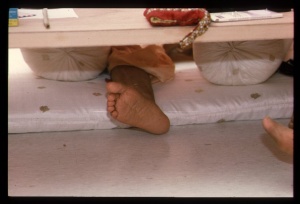SB 9.18.20-21: Difference between revisions
m (1 revision(s)) |
(Vanibot #0018 edit: make synonym terms in Sanskrit italic in SB - Vanisource) |
||
| Line 1: | Line 1: | ||
{{info | {{info | ||
|speaker= | |speaker=Devayānī wife of King Yayāti | ||
|listener=King | |listener=King Yayāti | ||
}} | }} | ||
[[Category:Srimad-Bhagavatam - Canto 09 Chapter 18]] | |||
[[Category:Bhagavatam Verses Spoken by Devayani, wife of Yayati Maharaja - Vanisource|091820]] | |||
<div style="float:left">'''[[Srimad-Bhagavatam]] - [[SB 9|Ninth Canto]] - [[SB 9.18: King Yayati Regains His Youth|Chapter 18: King Yayāti Regains His Youth]]'''</div> | |||
<div style="float:right">[[File:Go-previous.png|link=SB 9.18.19]] '''[[SB 9.18.19]] - [[SB 9.18.22]]''' [[File:Go-next.png|link=SB 9.18.22]]</div> | |||
{{RandomImage}} | |||
==== TEXTS 20-21 ==== | ==== TEXTS 20-21 ==== | ||
<div | <div class="verse"> | ||
taṁ vīram āhauśanasī | :taṁ vīram āhauśanasī | ||
prema-nirbharayā girā | :prema-nirbharayā girā | ||
rājaṁs tvayā gṛhīto me | :rājaṁs tvayā gṛhīto me | ||
pāṇiḥ para-purañjaya | :pāṇiḥ para-purañjaya | ||
hasta-grāho 'paro mā bhūd | |||
gṛhītāyās tvayā hi me | :hasta-grāho 'paro mā bhūd | ||
eṣa īśa-kṛto vīra | :gṛhītāyās tvayā hi me | ||
sambandho nau na pauruṣaḥ | :eṣa īśa-kṛto vīra | ||
:sambandho nau na pauruṣaḥ | |||
</div> | </div> | ||
| Line 21: | Line 27: | ||
==== SYNONYMS ==== | ==== SYNONYMS ==== | ||
<div | <div class="synonyms"> | ||
''tam''—unto him; ''vīram''—Yayāti; ''āha''—said; ''auśanasī''—the daughter of Uśanā Kavi, Śukrācārya; ''prema-nirbharayā''—saturated with love and kindness; ''girā''—by such words; ''rājan''—O King; ''tvayā''—by you; ''gṛhītaḥ''—accepted; ''me''—my; ''pāṇiḥ''—hand; ''para-purañjaya''—the conqueror of the kingdoms of others; ''hasta-grāhaḥ''—he who accepted my hand; ''aparaḥ''—another; ''mā''—may not; ''bhūt''—become; ''gṛhītāyāḥ''—accepted; ''tvayā''—by you; ''hi''—indeed; ''me''—of me; ''eṣaḥ''—this; ''īśa-kṛtaḥ''—arranged by providence; ''vīra''—O great hero; ''sambandhaḥ''—relationship; ''nau''—our; ''na''—not; ''pauruṣaḥ''—anything man-made. | |||
</div> | </div> | ||
| Line 28: | Line 34: | ||
==== TRANSLATION ==== | ==== TRANSLATION ==== | ||
<div | <div class="translation"> | ||
With words saturated with love and affection, Devayānī said to King Yayāti: O great hero, O King, conqueror of the cities of your enemies, by accepting my hand you have accepted me as your married wife. Let me not be touched by others, for our relationship as husband and wife has been made possible by providence, not by any human being. | With words saturated with love and affection, Devayānī said to King Yayāti: O great hero, O King, conqueror of the cities of your enemies, by accepting my hand you have accepted me as your married wife. Let me not be touched by others, for our relationship as husband and wife has been made possible by providence, not by any human being. | ||
</div> | </div> | ||
| Line 35: | Line 41: | ||
==== PURPORT ==== | ==== PURPORT ==== | ||
<div | <div class="purport"> | ||
While taking Devayānī out of the well, King Yayāti must certainly have appreciated her youthful beauty, and therefore he might have asked her which caste she belonged to. Thus Devayānī would have immediately replied, "We are already married because you have accepted my hand." Uniting the hands of the bride and bridegroom is a system perpetually existing in all societies. Therefore, as soon as Yayāti accepted Devayānī's hand, they could be regarded as married. Because Devayānī was enamored with the hero Yayāti, she requested him not to change his mind and let another come to marry her. | While taking Devayānī out of the well, King Yayāti must certainly have appreciated her youthful beauty, and therefore he might have asked her which caste she belonged to. Thus Devayānī would have immediately replied, "We are already married because you have accepted my hand." Uniting the hands of the bride and bridegroom is a system perpetually existing in all societies. Therefore, as soon as Yayāti accepted Devayānī's hand, they could be regarded as married. Because Devayānī was enamored with the hero Yayāti, she requested him not to change his mind and let another come to marry her. | ||
</div> | </div> | ||
__NOTOC__ | |||
<div style="float:right; clear:both;">[[File:Go-previous.png|link=SB 9.18.19]] '''[[SB 9.18.19]] - [[SB 9.18.22]]''' [[File:Go-next.png|link=SB 9.18.22]]</div> | |||
__NOTOC__ | |||
__NOEDITSECTION__ | |||
Revision as of 10:11, 1 December 2017

A.C. Bhaktivedanta Swami Prabhupada
TEXTS 20-21
- taṁ vīram āhauśanasī
- prema-nirbharayā girā
- rājaṁs tvayā gṛhīto me
- pāṇiḥ para-purañjaya
- hasta-grāho 'paro mā bhūd
- gṛhītāyās tvayā hi me
- eṣa īśa-kṛto vīra
- sambandho nau na pauruṣaḥ
SYNONYMS
tam—unto him; vīram—Yayāti; āha—said; auśanasī—the daughter of Uśanā Kavi, Śukrācārya; prema-nirbharayā—saturated with love and kindness; girā—by such words; rājan—O King; tvayā—by you; gṛhītaḥ—accepted; me—my; pāṇiḥ—hand; para-purañjaya—the conqueror of the kingdoms of others; hasta-grāhaḥ—he who accepted my hand; aparaḥ—another; mā—may not; bhūt—become; gṛhītāyāḥ—accepted; tvayā—by you; hi—indeed; me—of me; eṣaḥ—this; īśa-kṛtaḥ—arranged by providence; vīra—O great hero; sambandhaḥ—relationship; nau—our; na—not; pauruṣaḥ—anything man-made.
TRANSLATION
With words saturated with love and affection, Devayānī said to King Yayāti: O great hero, O King, conqueror of the cities of your enemies, by accepting my hand you have accepted me as your married wife. Let me not be touched by others, for our relationship as husband and wife has been made possible by providence, not by any human being.
PURPORT
While taking Devayānī out of the well, King Yayāti must certainly have appreciated her youthful beauty, and therefore he might have asked her which caste she belonged to. Thus Devayānī would have immediately replied, "We are already married because you have accepted my hand." Uniting the hands of the bride and bridegroom is a system perpetually existing in all societies. Therefore, as soon as Yayāti accepted Devayānī's hand, they could be regarded as married. Because Devayānī was enamored with the hero Yayāti, she requested him not to change his mind and let another come to marry her.